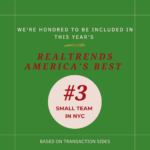In addition to a new tax code that has drawn the ire of many New Yorkers, 2018 has brought with it a material rise in mortgage interest rates. Mortgage rates have now risen for eight consecutive weeks to start the year, and, with the economy chugging along and continued robust home sales, the Federal Reserve is not planning on doing anything to return to the days of 3% 30-year fixed rate loans. While current rates are materially higher than they have been for the past several years, as the Federal Reserve kept rates low in order to help the economy emerge from the Great Recession, they are still historically low, especially when compared to where they were at the peak of the last cycle, when rates were rarely seen below 6%.
Higher mortgage interest rates should, theoretically, cause home prices to drop due to the increased ownership costs, all else being equal, but that doesn’t necessarily happen – at least not immediately. There are many other factors at play here in the NYC market that keep pricing high – namely, low inventory and high demand, which to have a more direct effect on pricing.
Rising interest rates do, however, make buyers panic (because who wants to pay more than they have to?!?!), and this can cause significant pain for a buyer during the course of a transaction as buyers wait to close. Loan officers are often part of the problem since they can make buyers paranoid that they will miss out on a certain rate, causing them to lock in a rate too early in the process and for too short a period of time. Most often, this happens with loan officers based outside of the City who do not understand the idiosyncrasies of buying a co-op or condo here and the typical 60-90 days it takes from contract to close.
I see this over and over again:
- Buyer signs a contract.
- Buyer shops around for the best interest rate, often calling several banks.
- Buyer is offered a rate from some bank’s call center in the Midwest that is .125% lower than the rate offered by the NYC-based loan officer I referred to them.
- Loan officer tells Buyer to lock in their interest rate immediately to protect against rising interest rates.
- Buyer locks rate for 30 or 60 days (even though his broker has told him to expect 90 days to close).
- Buyer starts to stress out as the rate lock approaches its expiration and the closing cannot yet be scheduled.
- Buyer pays to extend the rate lock – often in the thousands of dollars.
The practical reality of the situation is that it is not the worst thing in the world if a buyer waits to lock their rate and suffers an increase of .125% (certainly relative to what amounts to another high closing cost to extend a rate lock). Taking, for example, a $1,000,000 mortgage with a 3.875% interest rate on a 30-year amortization, your monthly payment will be $4,702/month. If you happen to miss out on that 3.875% interest rate and get stuck with a 4% rate, your monthly payment will be $4,774/month – a difference of $72/month – far less in present value terms than a payment of thousands of dollars up front (and on top of all that money you have to pay at closing).
The moral of the story is don’t lock your interest rate unless you are fairly certain that you will be closing within the rate lock period (ALWAYS TALK TO YOUR BROKER BEFORE LOCKING!!!). If you are buying a co-op, do not lock until you have submitted your board application, and ALWAYS get a 90-day lock.




